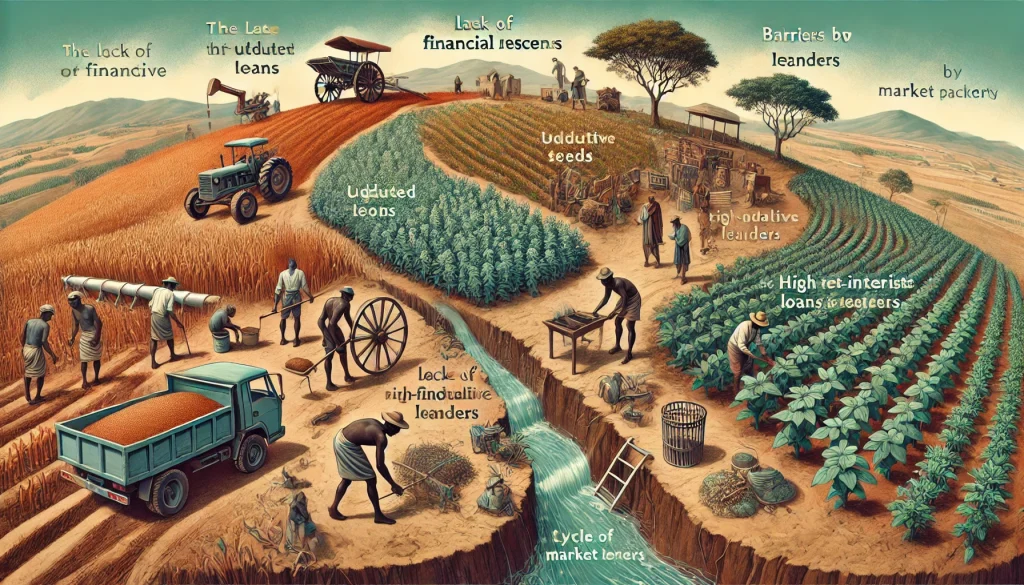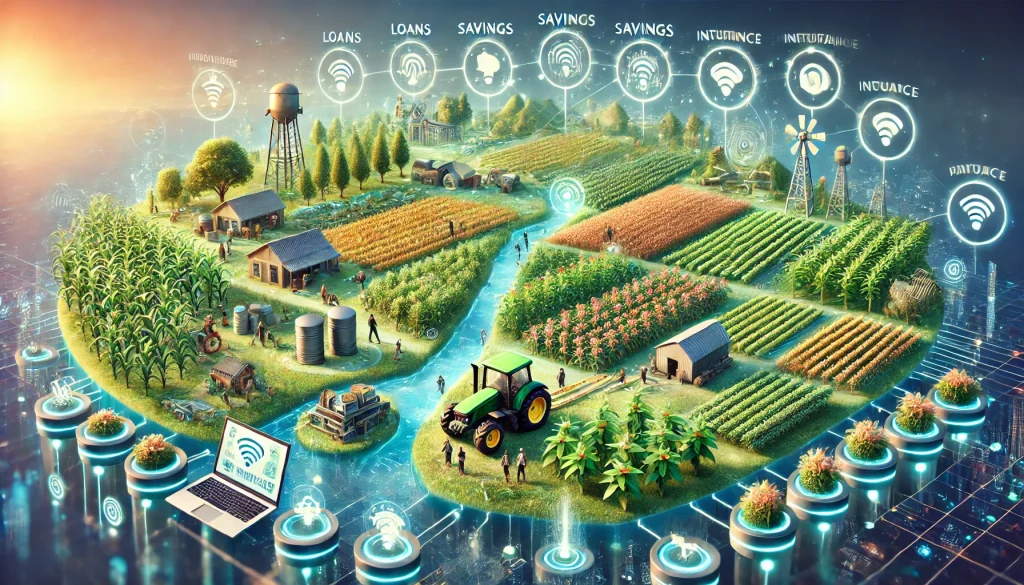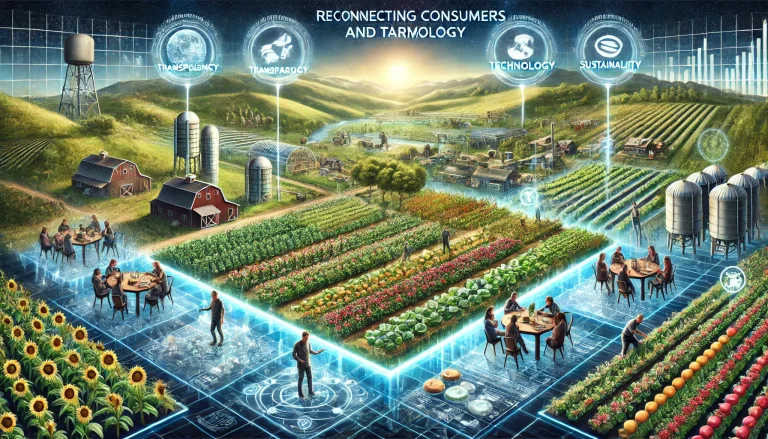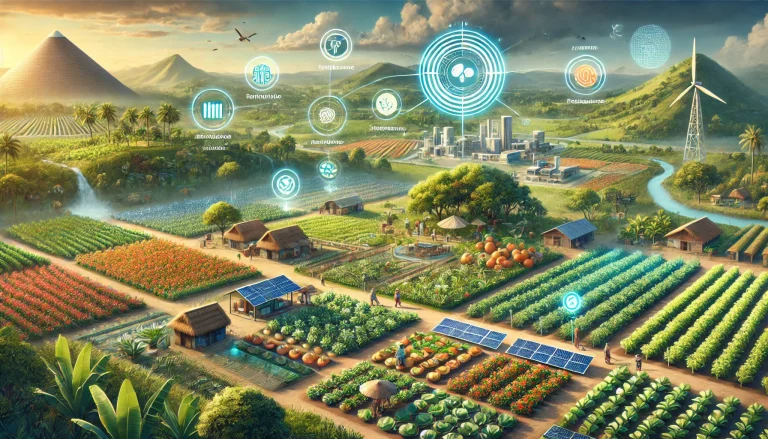Problem Statement:
Smallholder farmers, who represent a significant portion of the global agricultural workforce, face considerable challenges due to limited access to financial resources. These farmers often operate on tight margins, struggling to secure the funds needed to invest in essential inputs such as high-quality seeds, modern equipment, and advanced technology. This financial constraint not only hinders their productivity but also limits their ability to compete in increasingly competitive markets. Without access to credit, insurance, and other financial services, smallholder farmers are trapped in a cycle of low yields and low income, which perpetuates poverty and food insecurity in many rural communities. The lack of investment also makes it difficult for these farmers to adopt sustainable practices that could improve their resilience to climate change and other environmental challenges. Furthermore, the absence of financial literacy and access to digital financial platforms exacerbates the problem, as many smallholder farmers are unable to navigate or even reach formal financial systems. To break this cycle, it is crucial to develop a platform that provides smallholder farmers with accessible financial services tailored to their unique needs, enabling them to invest in their farms, increase productivity, and achieve economic stability.
Pain Points:
- Lack of Access to Credit: Smallholder farmers struggle to secure loans due to lack of collateral and credit history.
- High Interest Rates: Available loans often come with prohibitively high-interest rates, making them unaffordable.
- Limited Access to Insurance: Farmers face significant risks without crop insurance, leaving them vulnerable to losses.
- Inadequate Financial Literacy: Many farmers lack the knowledge to manage finances or understand financial products.
- High Cost of Inputs: The inability to afford quality seeds, fertilizers, and equipment limits productivity.
- Market Access Barriers: Without financial support, farmers struggle to reach profitable markets.
- Dependence on Informal Lending: Farmers often rely on informal lenders who charge exorbitant interest rates.
- Digital Divide: Limited access to digital financial services due to poor infrastructure and technology literacy.
- Economic Vulnerability: Low income and lack of savings leave farmers unable to invest in growth.
- Regulatory Hurdles: Complex and inaccessible financial regulations further impede access to formal financial services.

Future Vision:
The future of smallholder farming lies in the creation of an inclusive financial ecosystem that empowers farmers to invest in their operations and achieve sustainable growth. This vision involves developing a digital platform specifically designed to meet the financial needs of smallholder farmers, providing them with easy access to credit, insurance, savings, and payment services. The platform would leverage mobile technology to reach farmers in remote areas, offering user-friendly interfaces and financial literacy resources to ensure that farmers can effectively manage their finances. By utilizing alternative credit scoring models that take into account a farmer’s production history and market engagement, the platform would enable access to affordable loans without the need for traditional collateral. Partnerships with microfinance institutions, banks, and agricultural cooperatives would facilitate the provision of low-interest loans and tailored insurance products that protect against crop failure, extreme weather, and other risks. Additionally, the platform would offer tools for managing expenses, tracking income, and planning for future investments, helping farmers build financial resilience. Through integration with digital marketplaces, the platform would also connect farmers with buyers, ensuring fair prices and stable income. Ultimately, this financial platform would help smallholder farmers break free from the cycle of poverty, enabling them to invest in better seeds, equipment, and sustainable practices, leading to increased productivity and improved livelihoods.
Use Cases:
- Microcredit Access: Farmers use the platform to apply for small loans with low-interest rates, based on their production history rather than traditional collateral.
- Crop Insurance Enrollment: The platform provides easy access to affordable crop insurance, protecting farmers from losses due to extreme weather or pests.
- Mobile Savings Accounts: Farmers open and manage savings accounts through mobile devices, helping them save for future investments.
- Financial Literacy Tools: The platform offers educational resources to improve financial management and decision-making skills.
- Digital Payments: Farmers make and receive payments securely through the platform, reducing reliance on cash transactions.
- Input Financing: The platform facilitates loans specifically for purchasing seeds, fertilizers, and equipment, ensuring timely access to inputs.
- Market Linkages: Farmers connect with buyers and cooperatives through the platform, securing better prices for their produce.
- Alternative Credit Scoring: The platform uses production data and market engagement to assess creditworthiness, enabling more farmers to access loans.
- Expense Tracking: Farmers use the platform to monitor their income and expenses, helping them plan and allocate resources effectively.
- Peer-to-Peer Lending: The platform enables community-based lending, where farmers can borrow from and lend to each other at low interest rates.
Target Users and Stakeholders:
Target Users:
- Smallholder farmers in rural and developing regions seeking financial support.
- Agricultural cooperatives and farmer associations promoting access to financial services.
- Agribusinesses interested in supporting smallholder farmers and securing supply chains.
Stakeholders:
- Microfinance institutions and banks providing loans and financial products to farmers.
- NGOs focused on rural development, financial inclusion, and poverty reduction.
- Government agencies regulating agricultural finance and supporting rural development.
- Technology companies developing digital financial platforms for the agricultural sector.
- Consumers and markets benefiting from increased agricultural productivity and food security.
Key Competition:
- Kiva: A micro-lending platform that connects lenders with borrowers in developing regions, including smallholder farmers.
- FarmDrive: A fintech company using alternative data to provide loans to smallholder farmers in Africa.
- Apollo Agriculture: Offers bundled services, including financing, insurance, and inputs, tailored to smallholder farmers in Kenya.
- Agri-wallet: A digital wallet and financial platform that enables farmers to save, borrow, and make payments for agricultural inputs.
- Juhudi Kilimo: Provides asset financing for smallholder farmers, focusing on equipment and livestock.
Products/Services:
- Microloans: Small, low-interest loans tailored to the needs of smallholder farmers, with flexible repayment options.
- Crop Insurance: Affordable insurance products that protect farmers from crop losses due to weather, pests, and diseases.
- Mobile Savings Accounts: Digital savings solutions that allow farmers to securely save money and plan for future investments.
- Digital Payment Systems: Secure platforms for making and receiving payments, reducing the need for cash transactions.
- Financial Literacy Programs: Educational resources and tools to help farmers manage their finances and make informed decisions.
- Input Financing: Loans specifically for purchasing agricultural inputs like seeds, fertilizers, and equipment.
- Market Linkage Services: Digital marketplaces that connect farmers with buyers, cooperatives, and other market actors.
- Alternative Credit Scoring: Innovative models that assess creditworthiness based on production data and market engagement rather than traditional collateral.
- Expense Management Tools: Platforms for tracking income, expenses, and budgeting to improve financial planning.
- Peer-to-Peer Lending Networks: Community-based lending solutions that allow farmers to borrow from and lend to each other.
Active Startups:
- FarmDrive: Uses data analytics to offer credit to smallholder farmers who lack traditional credit histories.
- Apollo Agriculture: Provides bundled services, including financing and insurance, to smallholder farmers through mobile technology.
- Agri-wallet: Focuses on providing digital financial services, including savings, loans, and payments, to farmers in Kenya.
- Juhudi Kilimo: Specializes in asset financing for smallholder farmers, helping them acquire productive assets like livestock and equipment.
- Tulaa: A mobile-based platform that connects farmers with input suppliers and financial services, offering credit and savings solutions.
Ongoing Work in Related Areas:
- Research on alternative credit scoring methods using non-traditional data sources to improve access to credit for smallholder farmers.
- Development of mobile-based financial services tailored to rural and remote areas, providing access to loans, savings, and insurance.
- Agri-fintech innovations focused on creating digital platforms that integrate financial services with agricultural inputs and market access.
- Partnerships between banks and technology companies to develop affordable financial products for smallholder farmers.
- Policy initiatives aimed at improving financial inclusion and supporting the economic empowerment of smallholder farmers.
Recent Investment:
- $100 million investment in Apollo Agriculture in 2023 to scale their services and reach more smallholder farmers in Africa.
- $75 million raised by FarmDrive in 2022 to expand their data-driven lending platform for farmers without traditional credit histories.
- $50 million in funding for Agri-wallet in 2023 to develop their digital financial platform and reach more farmers in Kenya.
- $35 million in venture capital for Juhudi Kilimo in 2024 to expand their asset financing services for smallholder farmers.
- $25 million invested in Tulaa in 2023 to enhance their mobile platform and integrate more financial services for farmers.
Market Maturity:
The market for financial services tailored to smallholder farmers is steadily maturing, driven by increasing recognition of the crucial role these farmers play in global food security and rural development. The rise of digital financial platforms and fintech innovations has opened up new opportunities for reaching previously underserved populations. Investments in microfinance, mobile banking, and digital wallets are growing, with a focus on providing affordable, accessible financial products to smallholder farmers. However, challenges remain, particularly in reaching remote areas with poor infrastructure and low levels of financial literacy. The next phase of market development will likely focus on scaling successful models, enhancing financial literacy, and deepening
partnerships between financial institutions, technology providers, and agricultural cooperatives. As the market continues to evolve, it holds the potential to transform the livelihoods of millions of smallholder farmers, enabling them to invest in their farms, increase productivity, and achieve economic independence.
Summary:
Smallholder farmers are the backbone of global agriculture, yet they face significant barriers to financial access that limit their productivity and perpetuate poverty. Without access to credit, insurance, and savings, these farmers struggle to invest in the seeds, equipment, and technology needed to compete in the market and improve their livelihoods. A digital platform designed to provide tailored financial services to smallholder farmers could bridge this gap, offering microloans, crop insurance, savings accounts, and more through accessible mobile technology. By leveraging alternative credit scoring, market linkages, and financial literacy tools, the platform would empower farmers to invest in their operations, increase productivity, and achieve sustainable growth. As the market for agri-fintech solutions matures, there is a significant opportunity to transform the financial landscape for smallholder farmers, contributing to global food security and rural development.



